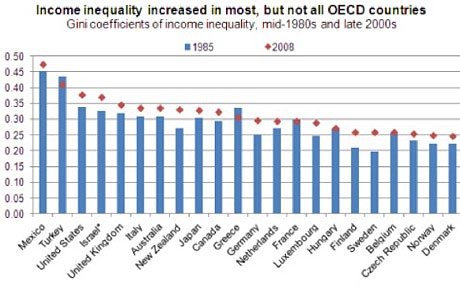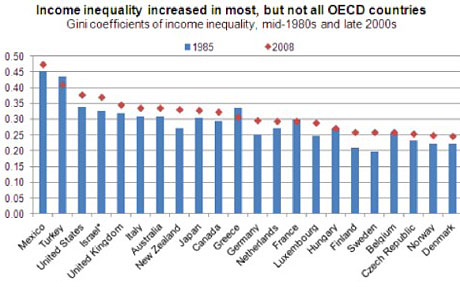
According to a new report by the Organization for Economic Cooperation and Development, income inequality — which has sparked the Occupy Wall Street movement in the U.S. — is increasing all across the developed world, led by bankers and executives reaping bigger and bigger income gains. In the OECD countries, the richest 10th of the population makes about nine times as much in average income as the poorest 10th , a significant increase from the gap in the 1980s:
The gap between rich and poor is widening across most developed economies as skilled workers reap more rewards and top executives and bankers benefit from a global job market, the Organization for Economic Cooperation and Development said.
The average income of the richest tenth of the population is now about nine times that of the poorest tenth, the Paris- based OECD said today in a report. The gap has increased about 10 percent since the mid 1980s.
Mexico, the U.S., Israel and the U.K. are among the countries with the biggest divide between rich and poor, while Denmark, Norway, Belgium and the Czech Republic are among those with the smallest gap. The earnings multiple is 14-to-1 in the U.S. and Israel, compared with about 10-to-1 in the U.K., Italy and Japan and 6-to-1 in Germany and Denmark.

In the U.S., “the rising incomes of executives and finance professionals account for much of the rising share of top income recipients.” The OECD recommends that the U.S. both increase taxes on high earners and boost benefits for low-income people, which average just 6 percent of household income in the U.S., compared to 16 percent across the developed world.
“The social contract is starting to unravel in many countries,” OECD Secretary-General Angel Gurria said in a statement. “This study dispels the assumptions that the benefits of economic growth will automatically trickle down to the disadvantaged and that the greater inequality fosters greater social mobility.”
Join us in defending the truth before it’s too late
The future of independent journalism is uncertain, and the consequences of losing it are too grave to ignore. To ensure Truthout remains safe, strong, and free, we need to raise $50,000 in the next 10 days. Every dollar raised goes directly toward the costs of producing news you can trust.
Please give what you can — because by supporting us with a tax-deductible donation, you’re not just preserving a source of news, you’re helping to safeguard what’s left of our democracy.